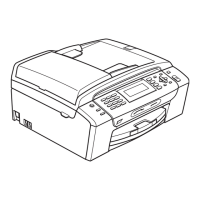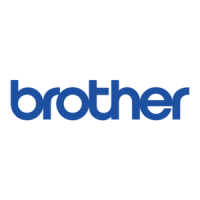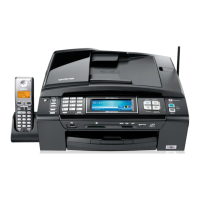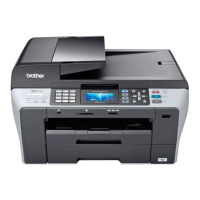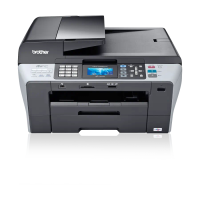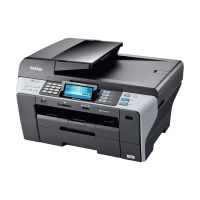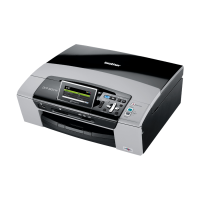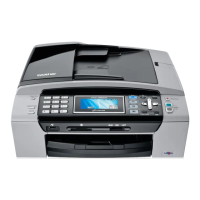
Do you have a question about the Brother MFC490CW - Color Inkjet - All-in-One and is the answer not in the manual?
| Printer Type | All-in-One |
|---|---|
| Print Technology | Inkjet |
| Max Print Resolution | 6000 x 1200 dpi |
| Display | 3.3" color LCD |
| Connectivity | USB, Wireless, Ethernet |
| Paper Handling | 100-sheet input tray |
| Functions | Print, Copy, Scan, Fax |
| Memory | 32 MB |
| Print Resolution | 6000 x 1200 dpi |
| Max Printing Speed | Up to 33ppm Black, Up to 27ppm Color |
| Scanner Resolution | 1200 x 2400 dpi |
| Media Types | Plain paper, envelopes, photo paper |
| Print Speed (Black) | Up to 33 ppm |
| Print Speed (Color) | Up to 27 ppm |
| Copy Speed (Color) | Up to 20 cpm |
| Copy Resolution | 1200 x 1200 dpi |
| Ink Cartridges | 4 (Black, Cyan, Magenta, Yellow) |
Information and steps for registering your Brother product online for owner verification.
Access to Brother Solutions Center for FAQs, software, and troubleshooting tips.
Contact information and support details for customer service and technical assistance.
Details on the manual's compilation, Brother Industries Ltd. supervision, and content disclaimers.
Defines who is covered by the limited warranty, including original buyers and users.
Details what the product, consumables, and accessories are covered under the warranty.
Lists exclusions from the warranty coverage, such as physical damage or misuse.
Provides steps to follow if the product requires warranty service, including contact information.
Outlines what information and actions Brother requires from the customer for warranty claims.
Explains Brother's process for repairing or replacing covered products under warranty.
Overview of documentation, symbols, software/network user guides, and control panel.
Instructions for loading various types of paper, envelopes, and documents into the device.
Guide to general settings, including power, paper, volume, and daylight saving time.
Details on security features like TX Lock, password configuration, and activation.
Comprehensive guide on sending faxes, including modes, ADF, scanner, color, and multi-send options.
Instructions on selecting and configuring fax reception modes like Fax Only, Fax/Tel, and Auto Answer.
Basic instructions for dialing numbers manually.
Setting up and using speed dial numbers for quick dialing.
Information on configuring and printing various fax and activity reports.
Details on setting up poll transmission and reception for faxing.
Step-by-step instructions for performing copying tasks, including quality and layout settings.
Guide to printing digital photos directly from memory cards or USB drives without a computer.
Instructions for printing photos directly from digital cameras, with or without PictBridge.
Settings for print quality, paper type, size, brightness, contrast, and color adjustments.
Process for scanning documents directly to memory cards or USB drives.
Explanation of common error messages encountered during PhotoCapture Center operations.
Important safety guidelines, legal notices, FCC compliance, and warnings for equipment use.
Comprehensive guide to troubleshooting common issues and performing routine maintenance tasks.
Detailed explanation of menus, functions, and button operations on the device.
Technical specifications for the printer, fax, scanner, and connectivity features.
Definitions of terms and functions used throughout the Brother manuals.
Alphabetical index of topics covered in the user guide for quick reference.
Overview of documentation, symbols, software/network user guides, and control panel.
How to access Brother's web resources, customer service, and support centers for technical help.
Explanation of the fax and telephone buttons, including Redial/Pause and Hook.
Description of the dialing keypad for entering numbers and information.
Overview of mode buttons for Fax, Scan, Copy, and Photo Capture functions.
Explanation of menu buttons for adjusting volume, speed dial, and navigating options.
Indicator for wireless connection strength and status.
Displays the amount of available memory on the device.
Shows the current ink volume status for the cartridges.
Indicates the current fax reception mode (Fax Only, Fax/Tel, etc.).
Shows the number of received faxes currently stored in the device's memory.
Step-by-step guide on changing device settings, using Temporiz. modo as an example.
Detailed instructions on loading various types of paper, envelopes, and documents into the device.
Guidance on properly loading envelopes and postcards, including types to avoid.
Instructions for using the photo paper tray for printing photographs.
Details on printable areas and non-printable margins for plain paper and envelopes.
Information on supported paper types, recommended Brother paper, and handling guidelines.
Recommendations for Brother paper types and articles for optimal print quality.
Guidelines for handling and storing paper and media to ensure proper printing.
Information on the paper capacity of the output tray.
Table detailing supported paper types and sizes for Fax, Copy, Photo Capture, and Print functions.
Table specifying paper weight, thickness, and capacity for different paper types.
Instructions on how to load documents into the Automatic Document Feeder (ADF).
List of supported document sizes for the ADF.
Step-by-step guide on loading documents into the ADF, including warnings.
Instructions for scanning documents using the flatbed scanner glass.
List of supported document sizes for the scanner glass.
Step-by-step guide on loading documents onto the scanner glass, including warnings.
Details on the scannable areas for Fax, Copy, and Scan functions, indicating non-scannable regions.
How to turn the device on and off, and its effect on operations.
Step-by-step instructions for turning off the device.
Step-by-step instructions for turning on the device.
Customizing the On/Off button behavior, including fax reception when off.
Setting the time delay before the device returns to standby or the last selected mode.
Guide to configuring the paper type for optimal print quality.
Instructions for setting the paper size to match the loaded paper for proper fax reception.
Adjusting volume levels for the ringer, alarm, and speaker.
How to adjust the ringer volume levels using the menu or directly.
Adjusting the volume for alarm sounds triggered by button presses or errors.
Adjusting the speaker volume for various functions.
Setting up automatic adjustment for daylight saving time based on date and time.
Configuring the inactivity timer before the device enters standby mode.
Adjusting the LCD screen contrast for better readability.
Adjusting the LCD backlight brightness for improved visibility.
Setting the time the LCD backlight remains on after inactivity.
Changing the wallpaper or background image on the LCD screen.
Preventing unauthorized access by locking transmission functions.
Steps to set up or change the password for the TX Lock feature.
How to access the Fax mode from the device's main menu.
Instructions for sending faxes using the Automatic Document Feeder.
Instructions for sending faxes using the flatbed scanner glass.
Specific steps for sending A4 documents from the scanner glass, including size settings.
How to send faxes in color to compatible equipment.
How to cancel a fax transmission that is currently in progress.
Sending the same fax message to multiple recipients automatically.
How to cancel a multi-send fax job that is currently running.
Advanced sending options like multiple configurations and contrast adjustments.
Sending faxes with various settings such as resolution, contrast, and scan size.
Adjusting the fax contrast for clearer documents.
How to change fax resolution for better quality or faster transmission.
Scanning faxes to memory while sending from memory or receiving.
Sending faxes immediately from memory, bypassing the usual queuing process.
Activating satellite mode to improve fax transmission in areas with potential line interference.
Scheduling faxes to be sent at a later time to save costs.
Sending multiple deferred faxes as a single transmission for efficiency.
How to check and cancel pending fax jobs in the device's memory.
Saving frequently used fax settings as default configurations.
Overview of different reception modes available on the Brother device.
Guide to choosing the appropriate reception mode based on phone line services.
Adjusting reception settings like ring counts and compatibility for optimal fax handling.
How to configure the device to automatically answer all calls as fax calls.
Setting the device to handle both fax and voice calls on the same line.
Configuring the device to require manual answering of all incoming calls.
Information on using an external answering machine with the fax line.
Adjusting reception settings like ring counts and compatibility for optimal fax handling.
Setting the number of rings before the device answers in Fax Only or Fax/Tel modes.
Configuring the duration of the distinctive ring for voice calls in Fax/Tel mode.
Feature that automatically answers fax calls, even if a phone is picked up first.
Using memory reception for incoming faxes, with options for fax forwarding or PC reception.
Setting up the device to automatically forward received faxes to another fax number.
Setting up the device to automatically forward received faxes to another fax number.
Notifying a locator number when a fax is received and stored in memory.
Storing received faxes in memory for remote retrieval.
Receiving faxes directly to a computer via PC-Fax software.
Changing the designated computer for PC-Fax reception.
Turning off memory reception features to free up device resources.
Modifying memory reception settings, including prompts for clearing or printing stored faxes.
Automatically reducing incoming fax pages to fit a single sheet.
Sending a fax after a phone conversation concludes.
Handling received faxes when the paper tray is empty.
Printing faxes that have been stored in the device's memory.
Accessing and retrieving fax messages remotely using a phone and remote access codes.
Setting up a personal four-digit remote access code for security.
Steps to use the remote access code to retrieve fax messages and manage device functions.
List of remote commands for managing fax reception, retrieval, and settings.
Performing voice calls using the external telephone or speed dial numbers.
Setting the dialing mode (Tone/Pulse) for Canadian users.
How the device handles calls in Fax/Tel mode when powered on.
Behavior of Fax/Tel mode when the device is powered off.
Information about Caller ID and Distinctive Ring services.
Managing voicemail conflicts when sharing a line with the Brother device.
Using the Brother device's feature to distinguish between voice and fax calls.
Utilizing Caller ID service to identify incoming callers and manage call history.
Step-by-step guide to connecting an external answering machine to the device.
Detailed instructions for connecting external devices, including TADs and phones, to the correct ports.
Recording a custom greeting message for the external answering machine.
Notes on using the device with special telephone line configurations like rollover or two-line systems.
Connecting external phones or extensions to the Brother device.
Step-by-step instructions for connecting external phones or extensions to the device.
How to use external phones or extensions for fax and voice calls.
Connecting and using a non-Brother wireless phone with the device.
How to use remote access codes to retrieve fax messages and manage device functions.
Basic dialing and storing of numbers for efficient communication.
Basic instructions for dialing numbers manually.
Step-by-step process for manual dialing.
Setting up and using speed dial numbers for quick dialing.
Searching for stored names and numbers in the abbreviated dialing memory.
Redialing busy or unanswered fax numbers automatically or manually.
Accessing and managing the list of recently dialed outgoing numbers.
Viewing and managing the history of incoming caller ID information.
Configuring simplified dialing through speed dialing and group setup for faxes.
Inserting dialing pauses for international calls or specific dialing sequences.
Storing up to 100 speed dial entries with names and multiple numbers.
Saving numbers from the outgoing call history directly to speed dial.
Saving numbers from the incoming call history (Caller ID) to speed dial.
Modifying or deleting existing speed dial entries, including names and numbers.
Creating and managing groups of speed dial numbers for sending faxes to multiple recipients.
Configuring fax verification reports and report frequency settings.
Printing transmission verification reports for sent faxes, including status and images.
Setting up automatic printing of fax activity logs at specified intervals.
Manual steps to print various reports like transmission logs, help lists, and call history.
Introduction to polling, allowing others to receive faxes from you and vice versa.
Setting up the device to receive faxes when called via polling.
Steps to configure the device to receive polled faxes, including entering the polling number.
Requesting documents from multiple fax machines in a single sequential operation.
Configuring the device to store a document for another fax machine to retrieve via polling.
Steps to set up the device to send documents via polling, including document storage and recipient setup.
Comprehensive guide to performing copying tasks, including quality, layout, and special copy functions.
Basic steps to initiate a copying process.
How to access the Copy mode from the device's main menu.
Step-by-step instructions for making a single copy of a document.
Instructions for making multiple copies of a document, up to 99.
How to stop a copying process that is currently running.
Adjusting various copy settings like quality, enlargement/reduction, and paper type.
Selecting copy quality settings (Fast, Normal, High) for different printing needs.
Adjusting the size of the copy by enlarging or reducing the original document.
Creating multiple-page documents onto a single sheet or printing posters.
Sorting multiple copies in the desired order using the ADF.
Adjusting the brightness and contrast of copies for better clarity.
Selecting the correct paper type for optimal copy quality.
Correcting dark or skewed edges when copying from the scanner glass.
Adding watermarks (logos or text) to copied documents.
Saving custom copy settings as default preferences for future use.
Resetting all copy settings to their original factory defaults.
Troubleshooting message indicating insufficient memory for copying tasks.
Printing digital photos directly from memory cards or USB drives without a computer.
Accessing the Scanner mode to scan documents to memory or USB drives.
Step-by-step guide for scanning documents to memory cards or USB flash drives.
Renaming scanned files before saving them to memory or USB.
Saving custom scan settings as default preferences.
Resetting all scanner settings to their original factory defaults.
Explaining common error messages related to memory cards and USB drives.
Instructions for scanning documents to memory cards or USB flash drives, including file format and quality settings.
Overview of the PhotoCapture Center functions for printing and scanning.
Printing photos directly from digital media without connecting to a computer.
Scanning documents directly to memory cards or USB drives.
Accessing memory cards or USB drives via the computer for PhotoCapture operations.
Information on compatible memory card types and USB flash drives.
Printing photos directly from PictBridge-compatible digital cameras.
Necessary conditions and requirements for using PictBridge connectivity.
Ensuring the digital camera is in the correct mode and setting up PictBridge options.
Printing individual photos, including previewing and selecting images.
Previewing photos on the LCD screen before printing, allowing selection and copy adjustments.
Printing an index sheet of thumbnail images for easy photo selection and reference.
Printing specific photos by referencing their number from the index sheet.
Editing photos with effects like auto-correction, skin tone, landscape enhancement, and red-eye removal.
Finding and selecting photos based on the date they were taken.
Printing all photos stored on the memory card or USB drive.
Viewing photos as a slideshow on the LCD screen, with options to print during the show.
Cropping photos to fit selected page sizes or print areas.
Printing photos based on the Digital Print Order Format (DPOF) from a digital camera.
Adjusting print settings like quality, paper type, size, brightness, and contrast.
Setting the number of copies for photos, index prints, and slideshow images.
Selecting print quality settings (Normal, Fine, Photo) for optimal results.
Choosing the correct paper type for the loaded media to ensure proper printing.
Setting the paper size and print layout for various paper types and sizes.
Adjusting the brightness of photos for lighter or darker prints.
Adjusting the contrast of photos for sharper and more vibrant images.
Activating color enhancement features for more vivid photo prints.
Cropping photos to fit selected page sizes or print areas.
Enabling borderless printing to maximize the print area on the paper.
Printing the date on photos if it's available in the image data.
Saving custom print settings as default preferences for repeated use.
Resetting all PhotoCapture Center settings to their original factory defaults.
Instructions for scanning documents to memory cards or USB flash drives, including file format and quality settings.
Saving custom scan settings as default preferences.
Resetting all scanner settings to their original factory defaults.
Explaining common error messages for PhotoCapture Center, including troubleshooting steps.
Printing photos directly from PictBridge-compatible digital cameras.
Necessary conditions and requirements for using PictBridge connectivity.
Ensuring the digital camera is in the correct mode and setting up PictBridge options.
Printing individual photos, including previewing and selecting images.
Previewing photos on the LCD screen before printing, allowing selection and copy adjustments.
Printing an index sheet of thumbnail images for easy photo selection and reference.
Printing specific photos by referencing their number from the index sheet.
Editing photos with effects like auto-correction, skin tone, landscape enhancement, and red-eye removal.
Finding and selecting photos based on the date they were taken.
Printing all photos stored on the memory card or USB drive.
Viewing photos as a slideshow on the LCD screen, with options to print during the show.
Cropping photos to fit selected page sizes or print areas.
Printing photos based on the Digital Print Order Format (DPOF) from a digital camera.
Printing selected images from a connected digital camera.
Printing photos based on the Digital Print Order Format (DPOF) from a digital camera.
Printing photos from digital cameras that use USB mass storage mode, without PictBridge.
Explaining common error messages encountered when printing from a camera, with troubleshooting steps.
Overview of software features, including printing, scanning, and network connectivity.
Instructions on how to navigate and read the HTML user guides for Windows and Macintosh.
Important safety guidelines, legal notices, FCC compliance, and warnings for equipment use.
Comprehensive guide to troubleshooting common issues and performing routine maintenance tasks.
Detailed explanation of menus, functions, and button operations on the device.
Technical specifications for the printer, fax, scanner, and connectivity features.
Definitions of terms and functions used throughout the Brother manuals.
Alphabetical index of topics covered in the user guide for quick reference.
Guidelines for selecting a safe and suitable location for installing the equipment.
Important warnings regarding installation near heat sources, water, or electrical hazards.
Notices about avoiding carpets, direct sunlight, and interference sources.
Warnings about high-voltage internal parts and electrical shock hazards during cleaning or operation.
Recommendations for surge protection and unplugging during electrical storms.
Guide to resolving common issues by checking conditions and following suggestions.
General troubleshooting steps for issues related to printing, connection, and drivers.
Troubleshooting specific printing problems like no output, poor quality, or incorrect alignment.
Addressing issues with print quality, ink cartridges, paper handling, and printer driver settings.
Troubleshooting common copying errors like inability to copy or poor copy quality.
Resolving issues with scanning, including TWAIN/WIA errors and poor scan quality.
Troubleshooting software installation and functionality problems, like FaceFilter Studio.
Resolving issues with removable media (memory cards, USB drives) and desktop access.
Troubleshooting network connectivity issues for printing, scanning, and PC-Fax.
On-screen error animations providing step-by-step guidance for paper jams.
Transferring faxes or activity logs to another fax machine or computer.
Sending fax data from the device's memory to another fax machine.
Transferring the fax activity log to another fax machine.
Steps to remove jammed documents from the Automatic Document Feeder (ADF).
Detailed instructions for clearing paper jams from the printer, ADF, and rear cover.
Step-by-step guide for replacing ink cartridges, including safety precautions.
Instructions for cleaning the exterior surfaces of the device using appropriate materials.
How to clean the scanner glass and ADF scanner components for optimal scan quality.
Cleaning the print head assembly to resolve print quality issues.
Printing a test page to check print quality and identify nozzle issues.
Adjusting print alignment to correct skewed text or misaligned images.
How to view the equipment's serial number on the LCD screen.
Instructions for properly packing and shipping the device to maintain warranty and prevent damage.
Guide to navigating and using the on-screen menu system for device programming.
A structured overview of menu options, default settings, and corresponding page numbers.
How settings are stored permanently, even after power loss.
Explanation of the function of various mode and menu navigation buttons.
How to input text using the device's keypad for settings like naming files or contacts.
A structured overview of menu options, default settings, and corresponding page numbers.
General settings menu for device configuration.
Accessing various fax-related settings and functions.
Network configuration settings for LAN and WLAN connections.
Settings for wireless network connection, including SSID, security, and configuration methods.
Configuration options for wireless network types like Ethernet and WLAN.
Initial setup options for configuring the device, including reception mode and language.
Selecting the appropriate fax reception mode (Fax Only, Fax/Tel, etc.).
Setting the resolution for outgoing faxes to optimize quality and transmission speed.
Adjusting the contrast for outgoing faxes to improve readability.
Managing speed dial entries for efficient fax dialing.
Configuring groups for multi-send fax operations.
Managing the list of outgoing calls for redialing or saving.
Accessing and managing the history of incoming calls with Caller ID information.
Setting up options for sending the same fax to multiple recipients.
Scheduling deferred fax transmissions for specific times.
Configuring batch transmission of deferred faxes for cost savings.
Accessing the Scanner mode for scanning documents to email, OCR, files, or storage media.
Scanning directly to memory cards or USB drives, with options for quality and file format.
Accessing and configuring copy settings like quality, paper type, size, and layout.
Selecting the copy resolution for different document types.
Adjusting copy size by enlarging or reducing the original document.
Setting the paper type for optimal copy quality.
Selecting the paper size for copying operations.
Adjusting the brightness of copies for lighter or darker results.
Adjusting the contrast of copies for sharper images.
Options for N-in-1 copying or creating posters from multiple pages.
Correcting dark or skewed edges when copying from the scanner glass.
Adding watermarks (logos or text) to copied documents.
Saving custom copy settings as default preferences.
Resetting all copy settings to their original factory defaults.
Customizing watermark settings, including text, position, size, angle, transparency, and color.
Accessing functions for viewing, printing, editing, and searching photos from memory media.
Previewing photos on the LCD screen before printing, allowing selection and copy adjustments.
Printing an index sheet of thumbnail images for easy photo selection and reference.
Printing specific photos by referencing their number from the index sheet.
Applying various photo editing effects like auto-correction, skin tone, and red-eye removal.
Finding and selecting photos based on the date they were taken.
Printing all photos stored on the memory card or USB drive.
Viewing photos as a slideshow on the LCD screen, with options to print during the show.
Cropping photos to fit selected page sizes or print areas.
Printing photos based on the Digital Print Order Format (DPOF) from a digital camera.
Configuring speed dial entries for simplified dialing using buttons.
